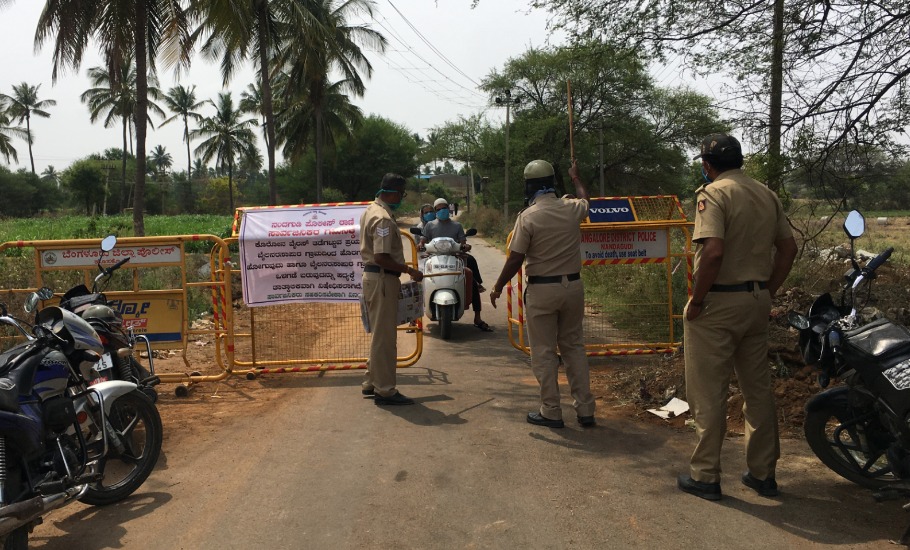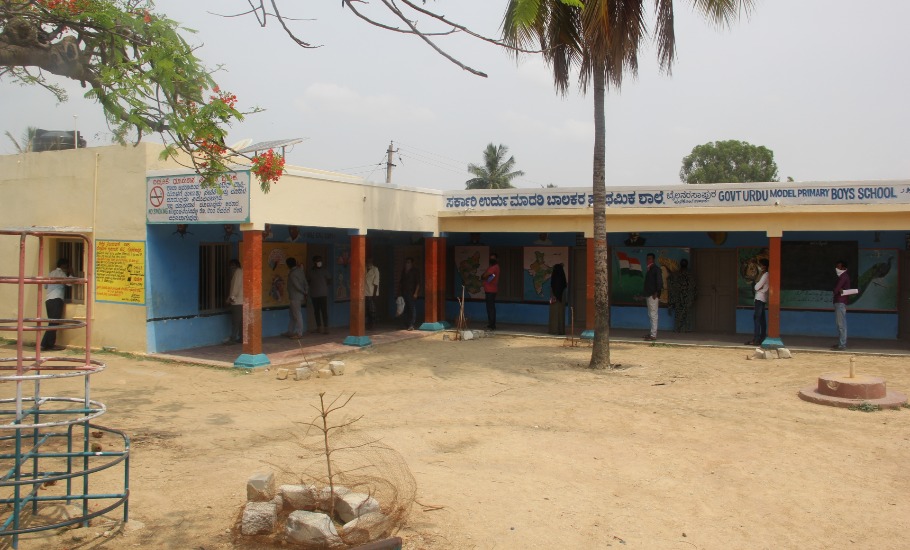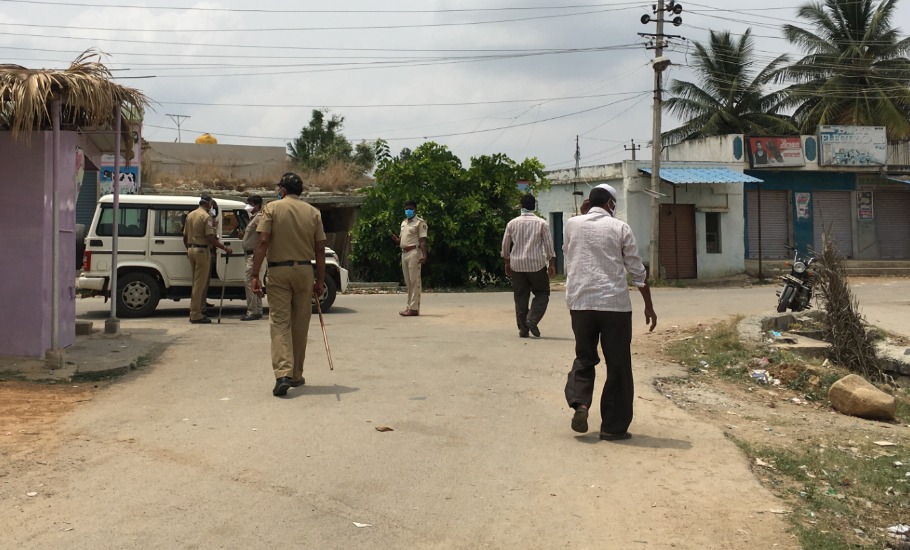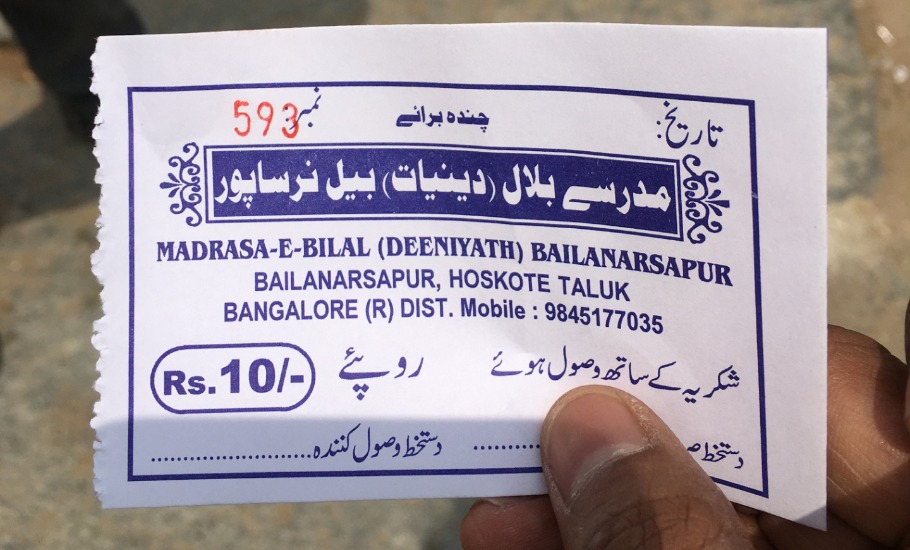
Bengaluru village sealed after Delhi-returnee tests COVID-19 positive
The roads leading to Bylanarasapura village in the rural districts of Bengaluru wore a deserted look as entry and exit points were guarded by the police. The restrictions are such that no one is allowed to exit or enter unless for a medical emergency.

The roads leading to Bylanarasapura village in the rural district of Bengaluru wore a deserted look as entry and exit points were guarded by the police.
The restrictions are such that neither is anyone allowed to exit the village unless it is for a medical emergency, nor an outsider is allowed to enter. Even the essential services such as stores which sell milk and vegetables are allowed to function only for two hours each in the morning and evening.

The village, which has less than 1,000 houses with an estimated population of about 4,000 people, was officially sealed after one of the villagers who returned from Delhi, tested positive for COVID-19 on April 7.
The police suspect that the patient might have attended the Delhi Tablighi Jamaat congregation last month.

The news spread like wildfire such that 20 kms away in Hoskote town, people were aware that a positive case was reported in their vicinity.
Farmers in the nearby villages were treated cautiously as there was a sense of fear about the pandemic.
The village primary school had turned into a collection point for the ration supplies with the officials issuing tokens to villagers to collect the food supplies in batches at different intervals.
Related news: No crops if lockdown extended: Karnataka farmers wary of distress
Bylanarasapura, which is a Muslim dominated area, witnessed people standing in a queue, maintaining social distancing, to collect the token. Even as the people did not express openly, many villagers subconsciously thought the Muslim community was at fault for the current health scare in their immediate vicinity.
Farmers around Hoskote, Sulibele and Nagarenahalli among others did not wish to venture out even for farming activities.
How the virus spread to the village?
A 43-year-old man returned from Delhi to Bengaluru on March 19 and was placed under home quarantine in Hoskote. But after finishing the 14 days period, the man went to his daughter’s place in Bylanarasapura, on April 2.
Coincidentally, it was also the time when Delhi’s Tablighi Jamaat congregation was making the headlines. The state police re-examined all travellers, particularly Muslim passengers, in the past month, said a jurisdictional police officer.
When they contacted the 43-year-old man to check again, he was not at home and was traced in Bylanarasapura only to be questioned if he attended the Tablighi Jamaat event.
The police said the person denied attending the event but their suspicion made them send him for the COVID-19 test, resulting in the man testing positive on April 7.

Following the incident, the family of the man was placed under quarantine in a district hospital and 14 people from three houses attached to the first patient’s residence, were put in isolation, a police officer told The Federal.
As the police, in coordination with the healthcare staff, the panchayat leaders and chief of mosques in the village, held a meeting to decide on how to implement the lockdown and contain the virus spread, on Saturday (April 11), three others from the 14 members who were quarantined, tested positive.
Related news: Karnataka farmers in distress over shutdown impact on supply-chain
As of April 11, of the 214 cases in the state, 72 were from Bengaluru urban limits (of which 19 are discharged) and four were from the rural districts.
There was little to no information available with the villagers about the first patient and his family was unavailable for contact.
The panchayat chairman MD Farook said, “The person did not belong to our village. But we have cases now in the village and we will follow all lockdown procedures to contain the virus,” adding that his panchayat members were coordinating with police, health officials and essential supplies vendors and planning to seal the entire village.
How did the village turn into a red-zone?
While the police were informed about sealing the village on April 7 soon after the first case was detected, they planned the proper implementation the next day.
The jurisdictional police sealed the four main roads leading to the village and barricaded the entry and exit points, except for one for the movement of essential services.
Two to three police personnel are said to be guarding each of those checkpoints at the entrance of the village, with two policemen on duty, and a police car with four policemen, patrolling in the village.
Related news: Amid COVID-19 lockdown, villages in Karnataka block outsider entry
At the entrance of the village, a police officer told The Federal that the health officials had sanitized the surroundings of the house where the first COVID-19 positive patient was staying the same day he was diagnosed with the infection.
“About 40 people from nearby four police stations are assisting the operation. We have sealed all the four main roads and allow people to exit the village only for health emergencies,” Raveendra N, Nandagudi, the jurisdictional police inspector said, adding that all the officers guarding the village are given enough masks and hand sanitizers.

However, at one of the checkpoints, a police officer rued that they were not even given gloves and masks, and that the man had children and feared going back home.
“Kindly somebody adopt this village and free us from this torture. The police, media and doctors never stop working. The government needs to protect too,” the police personnel said, even as he stood at the checkpoint, explaining why they should not venture out of the village.
Meanwhile, another police officer directed the vendors to open milk and vegetable shops for two hours daily in the morning and evening while keeping a check if they tried to overcharge the villagers, giving lockdown as the reason.
The mosques, which were already shut in the wake of the nationwide lockdown, were ordered to remain shut and chant the prayers on speakers.
Related news: Trio threatens to spread coronavirus to police, arrested in Karnataka
However, amid the restrictions, sealing the village had implications on people’s jobs where many are said to be daily wage labourers.
Babajan S, a carpenter, said, “The government giving ration is fine, but how will I earn and save? The lockdown will put us all in financial trouble.”
“We go out only for milk and other essentials in the house otherwise everyone stays indoors,” said Babajan’s father.
Questioning the government, the carpenter said, “Why did they let the person travel to a different village and how did they clear the man in Delhi? Because of the government’s lapses, we now have to suffer because an outsider entered the village and tested positive for COVID-19.”


